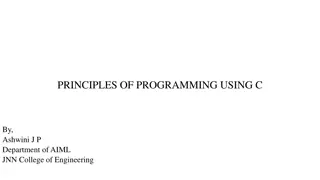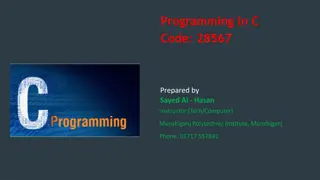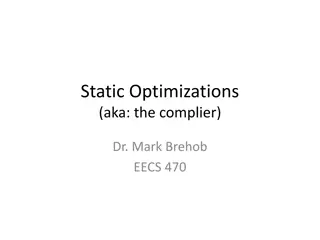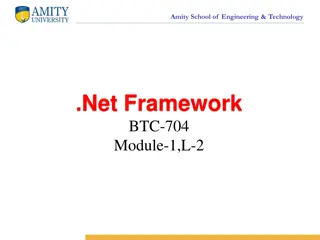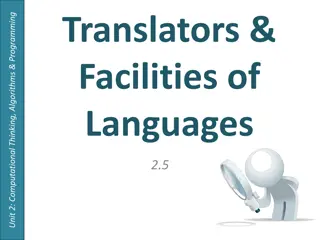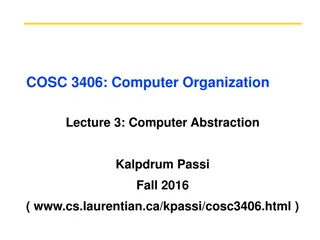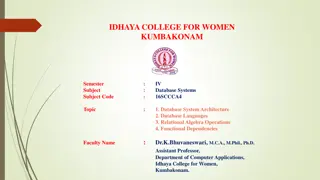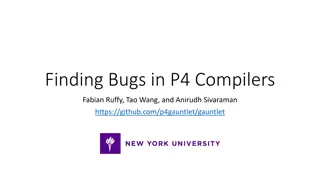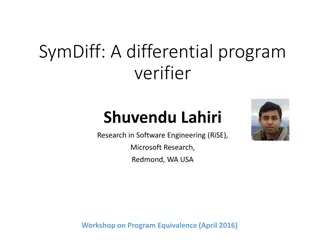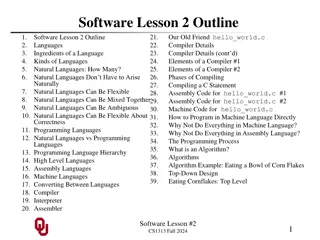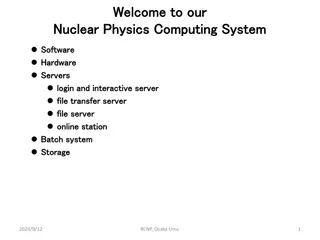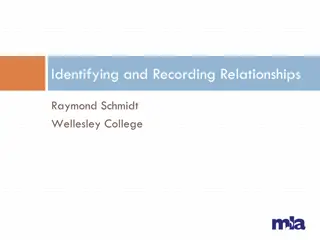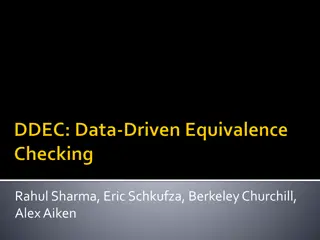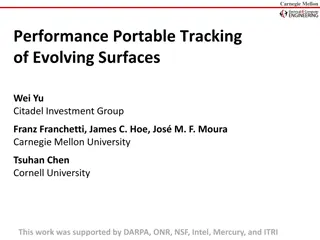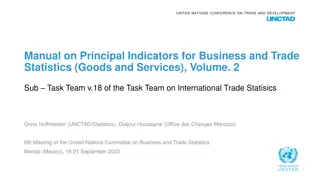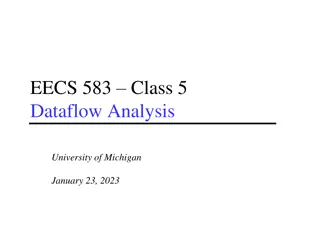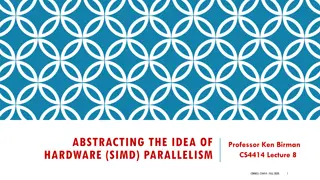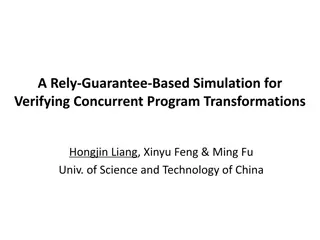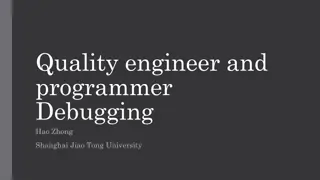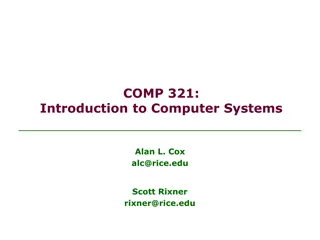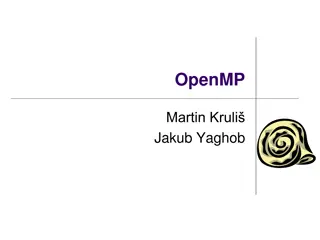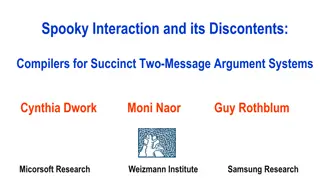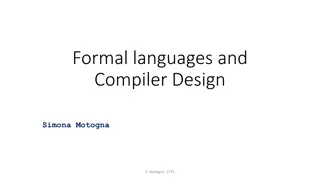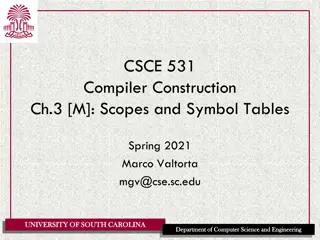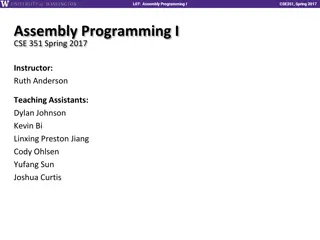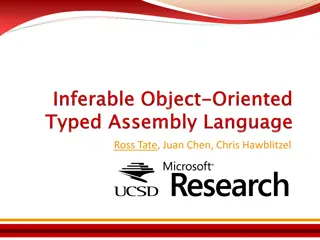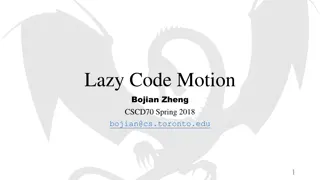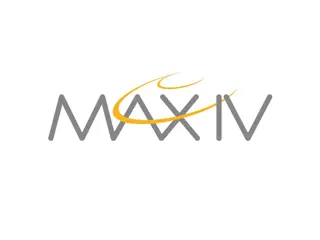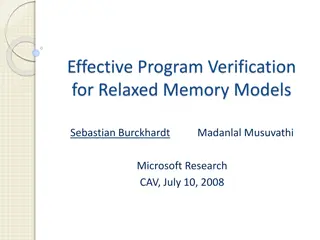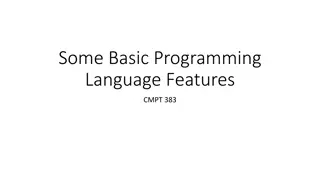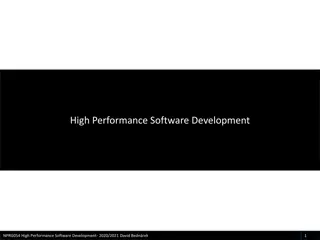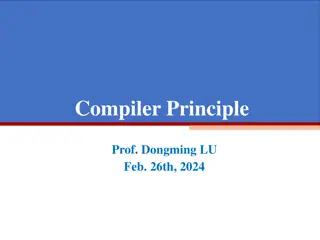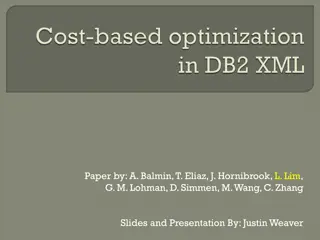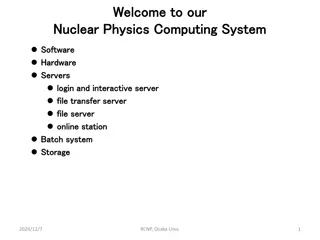Principles of Programming Using C
Introduction to C programming language, covering topics such as computers, efficient program design, program structures, files, compilers, variables, constants, input/output statements, compiling and executing programs. Characteristics of computers and their operations are also discussed.
5 views • 104 slides
Introduction to Fundamentals of C Programming
Explore the basics of C programming in Chapter 1, covering topics such as program generation, language compilers, algorithms, and flowcharts. Get a foundational understanding of program planning and development. Dive into examples to solidify your comprehension.
5 views • 93 slides
Static Optimizations
Explore the fundamental concepts of static optimizations in hardware architecture, focusing on compiler-driven techniques to improve performance and efficiency. Learn how compilers can enhance data locality, reduce unnecessary instructions, and minimize branches executed. Discover strategies such as
0 views • 42 slides
Overview of .NET Framework and CLR Architecture at Amity School of Engineering
Explore the .NET Framework and Common Language Runtime (CLR) architecture at Amity School of Engineering & Technology, covering topics such as .NET components, technical architecture, common language runtime, CLR execution model, and more. Discover the support for multiple languages and the .NET lan
0 views • 28 slides
Programming Languages and Translators in Computational Thinking
Programming languages are categorized into generations, from low-level machine code to high-level languages. Translators like assemblers, compilers, and interpreters help convert code for computer execution. Each generation has its characteristics and purposes, affecting ease of programming, debuggi
1 views • 18 slides
Computer Abstraction and Performance Metrics
Computer abstraction, instruction count, CPI, and performance metrics like clock cycles, CPU time, and program execution are crucial concepts in computer organization. Through examples and detailed explanations, this lecture explores how architecture, instruction sets, compilers, and algorithms impa
0 views • 27 slides
Overview of Database Systems Architecture and Languages
A database system is essential for storing and managing an organization's data. The architecture includes components like file manager, database manager, and query processor. Additionally, DML and DDL compilers play crucial roles in handling data manipulation and definition tasks. Various data struc
2 views • 28 slides
Introduction to Computers and C++ Programming Lecture 1 - Overview and Basics
This lecture covers the fundamental concepts in computer systems and programming using C++. Topics include the main components of a computer, bytes and addresses in memory, computer systems hardware and software, understanding programs, programming languages, compilers, preparing and running C++ pro
2 views • 21 slides
Finding Bugs in P4 Compilers
This presentation discusses the identification of bugs in P4 compilers through a combination of fuzzing and formal methods. It introduces Gauntlet, a tool suite developed for analyzing P4 compilers, and highlights the importance of ensuring the reliability of compilers for the P4 language due to the
0 views • 29 slides
SymDiff: A Differential Program Verifier
SymDiff is a platform that leverages program verification to analyze program differences, focusing on differential verification to verify properties of program variances rather than the program itself. The architecture, language subset, and modeling imperative programs/heaps are key components discu
2 views • 18 slides
Languages in Software Development
Exploring the fundamentals of languages in software development, this content covers natural languages, programming languages, and the components of a language like symbols, grammar, and semantics. It delves into the differences between natural and programming languages, highlighting the essential r
0 views • 39 slides
Nuclear Physics Computing System Overview
Explore the Nuclear Physics Computing System at RCNP, Osaka University, featuring software, hardware, servers, interactive tools, and batch systems for research and data processing. Discover the capabilities of Intel Parallel Studio, compilers, libraries, MPI applications, and access protocols for e
0 views • 16 slides
Relationships in Resource Description and Access (RDA)
Delve into the intricate web of relationships between resources and persons/families/corporate bodies as outlined in RDA guidelines. Explore the roles of creators, contributors, and compilers in the creation of works, manifestations, and items. Learn about recording creator relationships in MARC fie
0 views • 39 slides
Ensuring Equivalence in Compiler Optimization Programs
Explore the challenges of proving equivalence in compiler optimization programs, validate refactorings, and analyze the trustworthiness of compilers through binary equivalence testing. Learn about handling loops, utilizing decision procedures, and running tests to confirm program behavior.
0 views • 24 slides
Innovations in Performance Computing at Carnegie Mellon
Carnegie Mellon University is at the forefront of performance computing innovations, focusing on portable tracking of evolving surfaces, parallel and heterogeneous computing, software evolution, and compiler optimizations. They delve into the slow pace of change in programming languages, popular lib
0 views • 26 slides
Manual on Principal Indicators for Business and Trade Statistics - Volume 2
The United Nations Conference on Trade and Development has developed Volume 2 of the Manual on Principal Indicators for Business and Trade Statistics to meet policy needs and enhance the reading and analysis of international trade data. The manual aims to benefit statisticians, compilers, researcher
0 views • 13 slides
Dataflow Analysis and Optimization in Compilers at University of Michigan
Explore dataflow analysis techniques and optimization methods in the context of compilers through the course EECS 583 at the University of Michigan. Learn about identifying optimization opportunities, common subexpression elimination, liveness analysis, and more to enhance program efficiency and per
0 views • 28 slides
Hardware SIMD Parallelism Abstraction
Understanding the inherent parallelism in applications can lead to high performance with less effort, but the alignment with how Linux and C++ compilers discover parallelism is crucial. The shift towards making parallel computing more mainstream highlights the importance of SIMD operations and oppor
0 views • 50 slides
Rely-Guarantee-Based Simulation for Concurrent Program Transformations
Explore a rely-guarantee-based simulation approach for verifying concurrent program transformations, including compilers for concurrent programs, fine-grained implementations, and software transactional memory. Learn about defining correctness, compositionality, and verification aspects in the conte
0 views • 25 slides
Advanced Strategies for Effective Debugging in Software Development
Learn about quality engineering, programming, bug detection techniques, and common challenges in debugging complex software. Explore real-world scenarios, such as debugging Mozilla Firefox and handling various bugs in different environments like compilers, databases, and operating systems.
0 views • 35 slides
Introduction to Computer Systems - COMP.321 Overview
This course provides an in-depth understanding of computer systems, focusing on programming, exceptions, memory, I/O, networking, and system classes. Students learn about computer architecture, compilers, operating systems, and security. With a blend of theory and practical applications, the course
0 views • 21 slides
Introduction to OpenMP: A Parallel Programming API
OpenMP, an API for multi-threaded, shared memory parallelism, is supported by compilers like C/C++ and Fortran. It consists of compiler directives, runtime library resources, and environment variables. The history spans various specification versions, with features like tasks, SIMD, and memory model
0 views • 33 slides
Computer Programming Principles
Dive into the world of computer programming, covering high-level and machine languages, compilers, interpreters, writing programs, top-down design, and the array of programming languages available. Understand the essentials of building code to control computers, the diversity of programming language
0 views • 23 slides
Innovations in Succinct Two-Message Argument Systems
Discover the advancements in compilers for succinct two-message argument systems, exploring concepts like verification of work, interactive proofs, and encryption. Key topics covered include the compiler process, results obtained with secure FHE, and applications in verifying exhaustive search like
0 views • 6 slides
Formal Languages and Compiler Design by Simona Motogna - Overview
This content provides an in-depth look into the course "Formal Languages and Compiler Design" by Simona Motogna. Covering topics such as compiler design, organization issues, history of programming languages, structure of a compiler, scanning techniques, and more. It also delves into the components
0 views • 18 slides
Scopes and Symbol Tables in Compiler Construction
Scopes and symbol tables play a crucial role in programming languages by regulating the visibility of identifiers and establishing the relationship between binding and applied occurrences. Language issues such as single vs. multiple-pass compilation further impact the implementation of compilers, as
0 views • 26 slides
Assembly Programming in CSE351 Spring 2017
Explore the world of assembly programming through CSE351 in Spring 2017. Delve into topics like memory, data, x86 assembly, procedures, executables, arrays, and more. Learn about the differences in Java and C, machine code, hardware, compilers, and the factors that influence program performance. Und
0 views • 24 slides
Typed Assembly Language and Type Inference in Program Compilation
The provided content discusses the significance of typed assembly languages, certifying compilers, and the role of type inference in program compilation. It emphasizes the importance of preserving type information for memory safety and vulnerability prevention. The effectiveness of type inference me
0 views • 17 slides
Lazy Code Motion and Partial Redundancy Elimination in Optimizing Compiler
Lazy code motion, partial redundancy elimination, common subexpression elimination, and loop invariant code motion are optimization techniques used in compilers to improve code efficiency by eliminating redundant computations and moving code blocks to optimize performance. These techniques aim to de
0 views • 35 slides
Complete Guide to Compiling CPPtango with Conda
Learn how to compile CPPtango in a Conda environment using mamba, create isolated environments, and set up compilers and build tools easily. Conda simplifies package and dependency management for various languages like Python, R, and more across Windows, macOS, and Linux platforms. Explore the steps
0 views • 16 slides
Effective Program Verification for Relaxed Memory Models
Memory model vulnerabilities arise when programmers do not strictly adhere to locking disciplines in performance-critical code, leading to data races that can break on relaxed memory models. This can be challenging to detect and analyze due to the complexities introduced by both compilers and hardwa
0 views • 22 slides
Programming Language Features
Exploring syntax and semantics in programming languages, differences between interpretation and compilation, advantages and disadvantages of interpreters and compilers, and the concepts of static and dynamic behaviors in programming. Discover how different languages handle syntax and semantics, and
0 views • 7 slides
High Performance Software Development - Topics and Related Lectures
This course on High Performance Software Development covers various topics such as modern programming styles, CPU properties, performance tuning, compiler optimization, memory hierarchy, and more. It also emphasizes the importance of using vector instructions within C/C++ for parallel programming. T
0 views • 10 slides
Compiler Principle by Prof. Dongming LU: Overview and Phases
Compiler Principle course explores the translation of programming languages into executable code using techniques, data structures, and algorithms. The course covers modules, interfaces, and phases of a typical compiler, emphasizing the importance of abstract syntax and intermediate code. Key concep
0 views • 37 slides
Enhancements to DB2's Cost-Based Optimizer for XML Support
This paper discusses the acceptance of XML as a language for data interchange and the development of DB2 XML by IBM. It focuses on the extensions made to DB2's cost-based optimizer, emphasizing its support for XQuery as a query language. The paper also explores the largely declarative nature of XML
0 views • 20 slides
Overview of Nuclear Physics Computing System at RCNP, Osaka University
Explore the Nuclear Physics Computing System at RCNP, Osaka University, encompassing software like Intel Parallel Studio XE 2015 and compilers, access to servers for interactive and file transfer tasks, hardware details, and interactive server usage for remote login. Discover the diverse components
0 views • 16 slides
Overview of COMP.520: Compilers with S. Ali
An overview of COMP.520: Compilers with S. Ali covering topics such as LLVM, JIT compilers, interesting ID errors, virtual address table vs VAT pointer, PA4 overview, local declarations, field declarations, method declarations, and variable access. The course includes important announcements and rec
0 views • 63 slides
